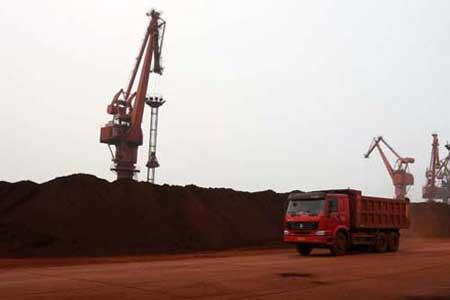
The Ministry of Commerce announced Tuesday the first round of 2011 export quotas for rare earths, standing at 14,446 tons, an 11 percent first-round drop on last year. [Xinhua]
The announcement that rare-earth exports would be cut next year points to China's dilemma in the production and trade of the minerals, analysts said.
The 11 percent reduction did not seem deep enough to match the repeated attempts by authorities to regulate the sector and to reduce its environmental impact, experts said.
They suggested that instead, given that the cut was not sufficient to truly impact on foreign buyers of China's rare earths, the world should blow a sigh of relief that the cuts were not worse.
The quota is not aimed at limiting the trade of rare earths, but instead seeks to regulate the sector and reduce its environmental impact, Chen Zhanheng, head of research at the Chinese Society of Rare Earths (CSRE), told the Global Times.
"China wouldn't trade its rare earths for huge economic returns at the risk of environmental degradation," Chen said. "International demand for China's rare-earth resources stands at only 50,000 tons annually, but that China's production of 200,000 tons of rare earths a year makes it necessary for the country to consolidate and regulate the industry."
The Ministry of Commerce announced Tuesday the first round of 2011 export quotas for rare earths, standing at 14,446 tons, an 11 percent first-round drop on last year.
It added that no quota had been set for the full year, and cautioned against predicting the full-year figure based on the quota for the first half.
According to traditional production processes, to produce each ton of rare earth will destroy 200 square meters of land, strip away 300 square meters of meter soil and cause catastrophic soil erosion, the China Business Times reported.
Due to China's large domestic rare-earth reserves, some countries stop exploring their own minerals due to pollution concerns while criticizing China's export reduction.
The US, holding 15 percent of the world's reserves, closed down its last rare-earth mine in 2002 and has ceased domestic exploitation since then, according to the Beijing-based International Business Daily.
The curbs have prompted renewed concerns from Japan, the US and Europe.
The US Trade Representative's office expressed concern over the latest announcement following complaints it made to the World Trade Organization last week against China's trade policy.
The complaints spoke out against alleged "excessive government intervention" with the country's rare-earth policy being highlighted.
Japanese high-tech giant Sony blasted China's latest quota, calling it a hindrance to free trade and that it would work to reduce its reliance on the minerals, which are crucial to producing high-tech goods.
With a third of global rare-earth reserves, China now supplies about 97 percent of global demand. But its status as a major producer does not give it more control over global pricing, experts said.
Rare-earth manufacturers are too scattered in China, and domestic enterprises vie fiercely for limited market shares, which makes it difficult for China to command the pricing power of the resource on the international market, Chen with the CSRE said.
Wang Caifeng, a former official of the Ministry of Industry and Information Technology (MIIT) said Tuesday at a forum that a rare-earth industry association is expected to be established in May and that it would will assist exporters in pricing negotiations with international buyers.
It is reasonable for China to slightly adjust its rare-earth exports, given increasing domestic demand, Wang was quoted by cri.cn, a news portal.
A tougher environmental regulation for the rare-earth sector is also expected to be unveiled next year, which will pump in billions of yuan in investment to upgrade the industry's technology, according to Zhang Anwei, deputy secretary-general of the CSRE.
"Many small and medium-sized rare earth enterprises are not equipped with advanced technologies, leading to the loss of the resources and environmental pollution," Zhang told the Global Times.
"The regulation will strengthen industry supervision by weeding out certain companies and will relieve pressures from other countries that recklessly demand that China raise its export quota," Chen said.





